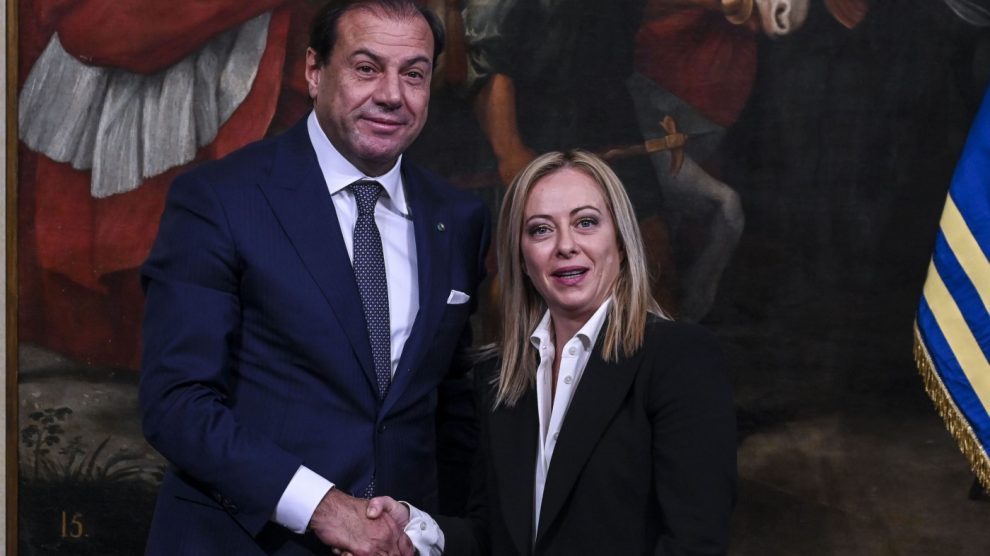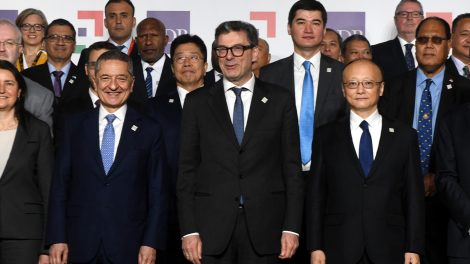The following are excerpts from our interview with Deputy Economy Minister Maurizio Leo. Read the full interview below.
On Italy renegotiating the EU-funded Recovery Plan. “The government wants to share with Europe, without running from it, a path leading to an update of the NRRP in order to cope with the emergencies of the current political and economic context.”
On tax reductions. “This government is committed to reducing the tax wedge as much as possible. Already in this budget law, even with limited resources, we have added a small piece for lower incomes.”
- “We will bring one of the pivotal battles of our program to Parliament: those who hire the most [must] pay the least. It’s necessary not only to reduce the tax burden on businesses, but also to ease the tax burden on workers by intervening, in reform, on income tax rates.”
On whether the new flat tax favours freelancers at the expense of employed workers. “Pending a fundamental systemic reform of the tax and contribution burden on all labour income – the flat tax of individual freelancers is not a privilege. Rather, it’s the mechanism to try to close the gap between the different tax and contribution wedges and, therefore, the net disposable income levels of workers.”
Giorgia Meloni’s first budget is returning to Parliament, laden with interventions that foreshadow Italy’s fiscal future. It plans to provide a solid foundation and sow the seed for a fairer tax system that serves growth. On taxation, always the most sensitive chapter of any self-respecting budget bill, the government says it has more to come.
To understand the work done so far, our sister website Formiche.net spoke with Maurizio Leo, Deputy Minister of the Economy. An expert in taxation and public administration, he was an economic adviser to Brothers of Italy – PM Meloni’s party – and architect of its economic and fiscal policy. Here’s
The 15% flat tax on self-employed incomes has been accused of representing a somewhat overly generous gift to freelancers at the expense of employed workers – as well as pushing many of the former to declare lower income to evade. What is your response?
I don’t believe we could frame it as an opposition between employees and the self-employed, forgetting that we are talking about two of the most fragile categories in our country – especially if we consider workers with medium or low-to-medium incomes. This risks creating unnecessary conflicts and further tensions. The problem is the whole tax system, which must be reformed in accordance with constitutional principles, as it is rife with distortions and inequities.
Can you please expand on this?
First, I’d like to note that the flat tax for the self-employed primarily responds to tax simplification objectives. It implies a 15% taxation of a flat-rate income, which in several cases is higher than the real income because of the non-recognition in deduction of the higher costs incurred in the production of that income. If this is not taken into account, the comparison risks being between uneven magnitudes. Not only that, in this debate, we focus on tax and neglect contribution, which is typically of greater importance for the self-employed. Therefore, it would be exceedingly appropriate to understand that – pending a fundamental systemic reform of the tax and contribution burden on all labour income – the flat tax of individual freelancers is not a privilege. Rather, it’s the mechanism to try to close the gap between the different tax and contribution wedges and, therefore, the net disposable income levels of workers.
The big regret of businesses is that of a failure to take decisive action on the tax wedge. The money, clearly, was not there, but can we expect a more decisive cut in labour costs in the coming months?
Absolutely. This government is committed to reducing the tax wedge as much as possible. Already in this budget law, even with limited resources, we have added a small piece for lower incomes. However, of course, we are aware that more needs to be done, including working on the tax component rather than merely the contribution component.
Do you already have any ideas or proposals in mind?
Together with Minister [of Labour and Social Policies] Calderone, we will bring one of the pivotal battles of our program to Parliament: those who hire the most pay the least. It’s necessary not only to reduce the tax burden on businesses but also to ease the tax burden on workers by intervening, via reforms, on income tax rates.
In recent weeks, there’s been a real fuss over the cash threshold. Where did the original – and now perhaps abandoned – idea, i.e. allowing to reject electronic payments under 60 euros, come from?
It is true; there has been a real fuss about cash. Totally unjustified, in my opinion. First of all, in spite of continuous fluctuations in the cash limit set by the law in recent years, there has been no significant change in the extent of tax evasion. This is a sign that there clearly isn’t a direct correlation between cash limits and the reduction of evasion. On the other hand, the EU’s decision to set the ceiling at €10,000 shows that the path taken is largely in line with EU indications. Regarding electronic payments, there are a number of ideas on the table.
Such as?
In the coming days, the government will develop a solution that protects both merchants and consumers. All, of course, are to be shared with the EU. At any rate, one cannot underestimate – especially with regard to small-value transactions – the fees charged to merchants, which risk eroding margins excessively.
Let us broaden the spectrum to the EU. Time and again, Brussels has reiterated one concept: the National Recovery and Resilience Plan can be modified but not revolutionised, or worse, overturned. Having clarified this point, what room for manoeuvre does the government expect on the NRRP from Brussels?
In any organisation, proper planning always presupposes updates as the reference context evolves. Clearly, when the NRRP was prepared, the national and international context was totally different. The government wants to share with Europe, without running from it, a path leading to an update of the NRRP in order to cope with the emergencies of the current political and economic context. It seems to us a duty, at least; asking is legitimate, and answering is courteous.




